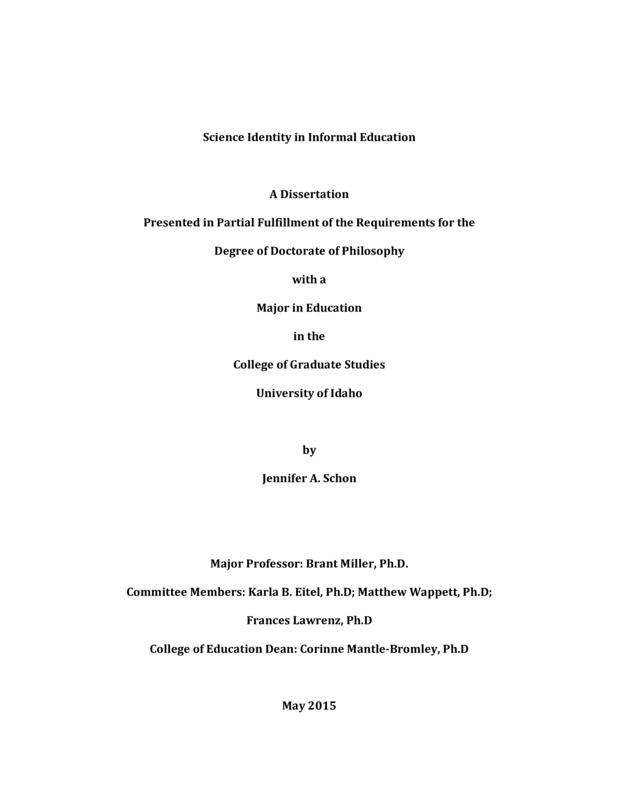Science Identity in Informal Education
Schon, Jennifer Alicia. (2015). Science Identity in Informal Education. Theses and Dissertations Collection, University of Idaho Library Digital Collections. https://www.lib.uidaho.edu/digital/etd/items/schon_idaho_0089e_10551.html
- Title:
- Science Identity in Informal Education
- Author:
- Schon, Jennifer Alicia
- Date:
- 2015
- Keywords:
- assessment education identity informal science
- Program:
- Curriculum & Instruction
- Subject Category:
- Education; Science education
- Abstract:
-
The national drive to increase the number of students pursuing Science Technology, Engineering, and Math (STEM) careers has brought science identity into focus for educators, with the need to determine what encourages students to pursue and persist in STEM careers. Science identity, the degree to which students think someone like them could be a scientist is a potential indicator of students pursuing and persisting in STEM related fields. Science identity, as defined by Carlone and Johnson (2007) consists of three constructs: competence, performance, and recognition. Students need to feel like they are good at science, can perform it well, and that others recognize them for these achievements in order to develop a science identity. These constructs can be bolstered by student visitation to informal education centers. Informal education centers, such as outdoor science schools, museums, and various learning centers can have a positive impact on how students view themselves as scientists by exposing them to novel and unique learning opportunities unavailable in their school. Specifically, the University of Idaho's McCall Outdoor Science School (MOSS) focuses on providing K-12 students with the opportunity to learn about science with a place-based, hands-on, inquiry-based curriculum that hopes to foster science identity development. To understand the constructs that lead to science identity formation and the impact the MOSS program has on science identity development, several questions were explored examining how students define the constructs and if the MOSS program impacted how they rate themselves within each construct. A mixed-method research approach was used consisting of focus group interviews with students and pre, post, one-month posttests for visiting students to look at change in science identity over time. Results from confirmatory factor analysis indicate that the instrument created is a good fit for examining science identity and the associated constructs for students attending the MOSS residential program. Analysis of results from paired-samples t-test indicates that MOSS does contribute to a positive change in science identity and this change does persist one month following the visit to MOSS, although a slight decline is seen. The results from this research and creation of this instrument provide useful tools for educators interested in increasing their students' science identity.
- Description:
- doctoral, Ph.D., Curriculum & Instruction -- University of Idaho - College of Graduate Studies, 2015
- Major Professor:
- Miller, Brant
- Committee:
- Eitel, Karla; Wappett, Matthew; Lawrenz, Frances
- Defense Date:
- 2015
- Identifier:
- Schon_idaho_0089E_10551
- Type:
- Text
- Format Original:
- Format:
- application/pdf
- Rights:
- In Copyright - Educational Use Permitted. For more information, please contact University of Idaho Library Special Collections and Archives Department at libspec@uidaho.edu.
- Standardized Rights:
- http://rightsstatements.org/vocab/InC-EDU/1.0/

